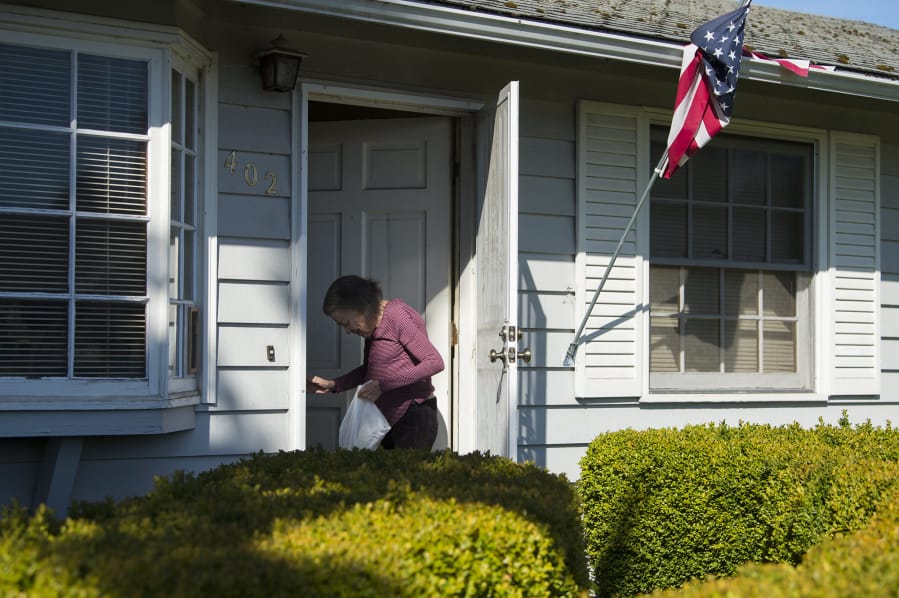Even though people 60 and older should stay home to protect themselves from COVID-19, they can avoid feelings of isolation with a bit of creativity, several experts said.
“You can still stay connected without being face to face,” said Julie Piper-Finley, director of marketing and communications for Meals on Wheels People, a regional organization that delivers prepared meals to 5,000 housebound seniors.
“You can call people on the phone, the old-fashioned way,” she said. Meals on Wheels People also suggests FaceTime or Skyping, if both parties have smartphones or computers with internet access.
“I have been doing FaceTime with my granddaughters, and they’re lively — they’re teenagers!” said Marjorie Ledell, past chair of the Clark County Commission on Aging. “They think about a lot of things I don’t ordinarily think about.”
Admittedly, communicating online can be a challenge for some older people, Ledell said.
“Many seniors aren’t really predisposed to technology,” she said, “but FaceTime, for me, has been really helpful.”
If technological hurdles are insurmountable, try something that never needs to be plugged in or booted up: writing a letter. Enclose a personal note in a cheerful card and send it through the mail or leave it on a doorstep. Take it one step further by attaching the letter to a new, unopened deck of cards or book of sudoku puzzles or word searches.
Piper-Finley calls this a “front porch exchange.” If you have older neighbors, she said, “bring them a crossword puzzle, jigsaw puzzle or a movie you really enjoyed.”
Piper-Finley described a friend who dropped off a meal, a bouquet of flowers and two rolls of toilet paper for an elderly neighbor — necessary items, but also something to lift the spirits.
A word of warning: Anyone who touches items to be delivered to an older person should be completely healthy, with not even a sniffle or the faintest cough. Nonperishable items can be left alone for a couple days before they’re used or opened.
“If you’re concerned, wipe it off with a Clorox wipe,” said Piper-Finley. “Just be cautious.”
If in-person delivery seems too risky, or you can’t wait to give or receive an encouraging word, email arrives immediately — and texting is perhaps an even better way to make an instantaneous connection, said Marian Anderson, past chair of the Clark County Commission on Aging.
Anderson, 67, stays in touch with her daughter via frequent text messages, and receives lots of photographs of her grandchildren.
“It’s easy to keep up with your friends that way,” she said. Anderson, who has started ordering groceries online, is sticking close to home on the advice of her daughter, who works for Clark County Public Health Department. To get out, she takes daily walks to nearby Jorgenson Woods Park.
“I like to walk,” Anderson said. “There are other seniors in my neighborhood that I see when I’m out walking and I chat with them while keeping a distance.”
Ledell echoes Anderson’s enthusiasm for getting outdoors, even if it’s close to home.
“I pick a time each day when I can walk outside. At least you can wave at people,” she said. “When you get outside, it stimulates different parts of your brain because you’re in motion. You’re taking in the sun and it’s a beautiful day, and that’s a benefit.”
For seniors with limited mobility, just going outside and seeing the sunshine or appreciating spring flowers can offer a mental boost — not to mention that these days neighbors are likely to be in their yards, too, and might welcome a (shouted) conversation about the weather.
When outside isn’t an option, the National Institute of Aging offers a webpage, www.nia.nih.gov/health/exercise-physical-activity, with exercises to get mood-lifting, loneliness-fighting endorphins flowing. The website also provides links to videos with routines designed for older adults. Seniors can add a social element by agreeing to exercise with a friend on Skype.
If you have an elderly neighbor, said Piper-Finely, “ring the doorbell and step back. You can still talk to them from the sidewalk, say hello and ask if they need anything.”
She suggested asking housebound neighbors if they need help with errands, walking the dog, mowing the lawn, or putting out or retrieving trash bins.
“Just check on them and say hey,” said Piper-Finley. “A lot of communities are pulling together and looking for ways that they can help their neighbors.”




